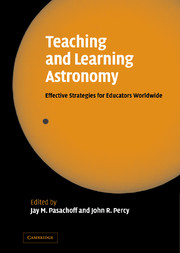Book contents
- Frontmatter
- Contents
- List of illustrations
- Preface
- Introduction
- Part I Astronomy in the curriculum around the world
- Part II Astronomy education research
- Part III Educating students
- Part IV Educating teachers
- Introduction
- 10 Pre-service astronomy education of teachers
- 11 In-service astronomy education of teachers
- Poster highlights
- Part V Astronomy and pseudoscience
- Part VI Astronomy and culture
- Part VII Astronomy in developing countries
- Part VIII Public outreach in astronomy
- Part IX The education programs of the International Astronomical Union
- Part X Conclusions
- Author index
- Subject index
11 - In-service astronomy education of teachers
Published online by Cambridge University Press: 18 May 2010
- Frontmatter
- Contents
- List of illustrations
- Preface
- Introduction
- Part I Astronomy in the curriculum around the world
- Part II Astronomy education research
- Part III Educating students
- Part IV Educating teachers
- Introduction
- 10 Pre-service astronomy education of teachers
- 11 In-service astronomy education of teachers
- Poster highlights
- Part V Astronomy and pseudoscience
- Part VI Astronomy and culture
- Part VII Astronomy in developing countries
- Part VIII Public outreach in astronomy
- Part IX The education programs of the International Astronomical Union
- Part X Conclusions
- Author index
- Subject index
Summary
Abstract: Astronomy education of schoolteachers is reviewed in the context of in-service training when astronomy is part, or not, of the school curriculum. The methods presented are based on in-service teacher training over the past 25 years, in France. The role of a network of motivated teachers with strong links with professional astronomers is emphasized.
Introduction
Whatever the country, in general few teachers are educated in astronomy during their university studies, astronomy being an optional subject. So in-service training of schoolteachers is necessary either because astronomy is in the school curriculum or because the teachers themselves are introducing some aspect of astronomy in their lessons.
The following points will be developed:
the context in which this training is taking place;
the methods used for such training, taking into consideration the fact that astronomy will be taught if the teachers feel confident.
Examples of in-service training are taken from the French educational system because it is applied to a large body of teachers, the French curriculum being a national one, and also because in-service training in astronomy started 25 years ago through the non-profit association CLEA (Comité de Liaison Enseignants Astronomes: Teacher-Astronomers Joint Committee), created in 1977 as a consequence of the Education Commission's “Teachers Day” during the Grenoble IAU General Assembly in 1976.
In-service training has to be undertaken in two directions: one that intends to give the necessary background in astronomy-astrophysics and the other that will give to the teachers themselves the possibility of developing pedagogical resources for their needs, not forgetting that schoolteachers are also active in semi-scholarly activities: clubs, educational projects.
- Type
- Chapter
- Information
- Teaching and Learning AstronomyEffective Strategies for Educators Worldwide, pp. 146 - 152Publisher: Cambridge University PressPrint publication year: 2005
- 1
- Cited by



